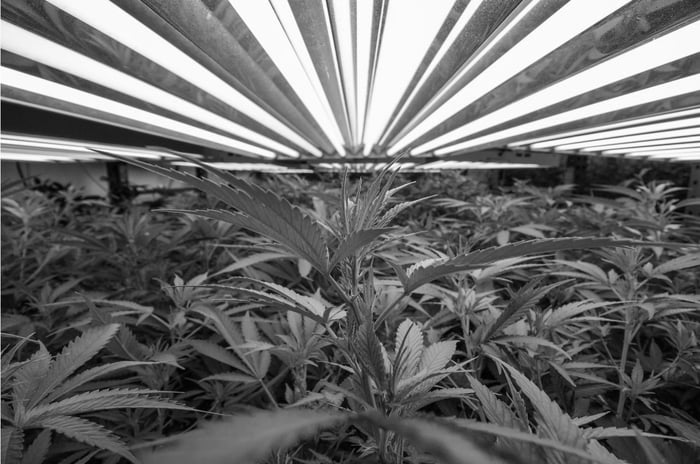 What's all the buzz about cannabis law? Attorneys and recruiters in the space share their views to help you get higher in your practice.
What's all the buzz about cannabis law? Attorneys and recruiters in the space share their views to help you get higher in your practice.
Strike up a conversation on the topic of cannabis and you could be met with anything from impassioned rhetoric to eyerolls (not to mention one or two knowing smirks). Opinions on the drug may vary, but what can’t be disputed is its evolution from counterculture status into a multibillion-dollar industry. $61 billion to be exact, according to research by Flowhub, which also found that in 2020 nationwide cannabis sales increased 67% in the US and support for legalization of the drug reached a record high of 68%. “It’s gone from handshake deals to documenting things on paper to capital markets transactions,” summarizes Robert Baca, the former executive director of the Sacramento Cannabis Industry Association, and manager of legal affairs at Adnant, the accounting and consultancy firm that took Weedmaps public.

“You need a lawyer who understands capital markets, capital formation, debt securities, etc., as well as the regulatory and legal landscape of the cannabis industry.” [Mitch Kulick]
Cannabis, quite simply, is on the up. “Firms are now recognizing the tremendous opportunity presented by the growing cannabis market, which is full of companies with many legal needs,” says Jennifer Fisher, partner and co-chair of Goodwin’s cannabis practice. In the cannabis world, “each state approaches cannabis regulations differently. It’s a patchwork system.” Lawyers are playing a crucial role for companies trying to navigate the fraught regulatory landscape.
“Cannabis lawyers in the early stages of the industry were primarily criminal lawyers, not corporate lawyers,” explains Mitch Kulick, co-founder and head of cannabis, securities and corporate at Feuerstein Kulick. But as the industry has grown, its overlap with traditional practice has become more pronounced, encompassing everything from funding to corporate governance. “If you’re now looking to build a cultivation facility, you need to be prepared to raise $40 million, and so you need a lawyer who understands capital markets, capital formation, debt securities, etc., as well as the regulatory and legal landscape of the cannabis industry.”
Given the “constantly evolving nature of the industry, with new legal issues and regulations always emerging,” Fisher says “there are so many opportunities for young lawyers to become experts in this field. It just takes a genuine interest, lots of drive and a commitment to understanding the industry.” Sean Burke, founding partner at Whistler Partners, sees parallels in how attorneys break into other new industries. “Someone writes a white paper about the value of virtual property in online video games and that cements them as a pioneer in their field. It’s no different in this industry. The origin stories of most people’s practice is ‘I saw that there were unanswered questions, so I went out and found my own answers.’” As Whistler managing director Tad Gruman emphasizes, “They’re literally writing the laws right now! If you’re a legal nerd, how cool is that?”

“Navigating regulatory peculiarities and state-based difficulties is part of the fun.” [Mike McQueeny]
A Green New Landscape?
Unlike many areas of practice stooped in statute and precedent, the ink is barely dry on many laws pertaining to cannabis. But is it classified as a brand new practice? Or is it simply redirecting traditional practices to a newly legalized product? “It’s new in the sense that this is the first time you’re going to see AmLaw 50 shops having a cannabis law button between broker-dealer and derivatives work,” says Amdie Mengistu, senior consultant at Whistler.
This tallies with Fisher’s take: “I would characterize this as a new area of law, but traditional legal principles still apply to many of the problems facing the industry.” When cannabis companies are entering into contracts, merging, or acquiring one another, they still require traditional corporate expertise. But “those transactions are always going to have a very specific cannabis overlay,” as these companies inevitably face “lots of regulatory oversight” into their activities.
“The antiquated laws making cannabis federally illegal touch various aspects of the practice,” adds Mike McQueeny, counsel in Foley Hoag’s cannabis practice. The disparity in state-wide and federal approaches puts cannabis companies in “a unique spot,” which throws up a lot of questions for their lawyers. And the answers “can’t always be pulled from precedent,” says Baca.
Originality is key. “You’re often looking at statutes and regulations without the guidance of precedent from prior court decisions,” says Fisher. “It’s an exciting challenge working without an established road map.” McQueeny agrees that “navigating regulatory peculiarities and state-based difficulties is part of the fun. Understanding different jurisdictions and how individual regulations have been interpreted is so interesting.”
“No one in this space is half-assed interested." [Tad Gruman]
The Draw
One thing that’s clear when you speak to anyone in this field is a level of enthusiasm that you’re unlikely to find at the tax bar, for example. “No one in this space is half-assed interested,” says Gruman. “People don’t do well in this field if they’re not sure.”
For Kulick, “what’s fun about being a cannabis lawyer is that your role transcends the traditional expectations of being a lawyer.” As he puts it, “the industry is an entirely startup industry,” and when working with cannabis startups in particular, “you’re often thinking through cases of first impression. It can be complex and complicated to think through scenarios for clients. It’s a little more art than science.”
Fisher’s motivation to work in the space is partly driven by social justice. In addition to her role at Goodwin, she’s also a Legal Advisor to the Last Prisoner Project, an organization committed to freeing ‘every last prisoner of the unjust war on drugs,’ with a specific focus on the 40,000 people incarcerated for cannabis offenses. “Figuring out how to move away from an era of prohibition where the war on drugs has impacted so many communities – particularly communities of color – and how to address these wrongs as legalization expands is an intriguing aspect of the work for me,” she shares.
The humane side of the industry was what appealed to Baca. “I thought the work would be along the lines of lobbying and working with legislators,” he recalls. “But we’re working with communities, doing ‘hearts and minds’ work. It sounds cheesy, but to have an impact that’s not just legal and help an industry grow from the very start is really great.”
“I go to sleep happy that I’m able to expand access for people benefitting both medicinally and holistically.” [Mike McQueeny]
For others, there’s also a personal pull to the practice. Gruman notes that knowing someone who has used cannabis medicinally may spur a desire to get into the field. “You see the help that the medicinal use has,” he notes, “and that’s going to make you passionate about wanting to further the acceptance and proper regulation of cannabis.”
This was the case for McQueeny. After seeing cannabis help a terminally ill family member to manage her symptoms, his conviction to work in this area was determined. “I’m helping scores of other folks just like my family,” he shares. “I go to sleep happy that I’m able to expand access for people benefitting both medicinally and holistically.”

"These companies were used to operating in the grey area, challenging or bending rules, and are now in one of the most highly regulated industries." [Robert Baca]
High Challenge, High Reward
Federal prohibition exacerbates many of the issues that the cannabis industry faces. For one, the fact that many cannabis companies “are still operating in cash and don’t have access to traditional forms of banking, lending or credit card processing is a tremendous challenge,” says Fisher. The yet-to-be ratified SAFE Banking Act would go some way in alleviating this burden by ending restrictions on financial institutions providing services to cannabis companies. It would “give comfort to banks to participate in the cannabis industry,” outlines Kulick, “which would be another brick in the wall of prohibition coming down”
But there isn’t much optimism that it’ll pass in the Senate (“I would be amazed if it did,” says Mengistu). For the time being, the reality is that these companies still operate solely in cash, which, says Baca, “really stunts the industry’s ability to grow.”
Another challenge facing cannabis companies is that they are still defined by their infancy. Despite some companies having achieved significant growth, “you still have to deal with the reality that these companies are startups and the good and the bad that comes with that reality,” says Kulick, be it encountering “entrepreneurs, cowboys, and, by definition at federal level, some ‘criminals’.” He adds: “Going back a decade, these companies were not necessarily the best at corporate governance, documentation, or accounting.”
Baca also speaks to this shift. “These companies were used to operating in the grey area, challenging or bending rules, and are now in one of the most highly regulated industries,” he says. “Playing the role of the negotiator between those two worlds is both fun and challenging.” And like in any startup scene, the “speed and all-encompassing nature of the work” is both the appeal and the challenge, says Kulick.
“At partner level, it’s also hard to show portable business in this space.” [Amdie Mengistu]
From a recruitment standpoint, the industry’s infancy means that “it’s hard finding people with experience,” Mengistu says. “And at partner level, it’s also hard to show portable business in this space.” Recruiters have to fish in adjacent practices to find people who’ve dabbled in cannabis – Gruman gives the example of “a real estate attorney who has a $2 million book with only $200,000 coming from cannabis clients.” It’s a challenge for the recruiters, but for the corporate generalist who’s worked on a handful of cannabis deals, it’s definitely an advantage.
Roll Up, Roll Up
So in the absence of longevity, what can associates looking to pivot their practice to cannabis bring to the table? “Because it’s a newly emerging commercial space, the skillset is emerging company and general corporate work,” says Mengistu. Venture capital too – “if you’re the savvy financial player that’s seeing a shift in the social mores that can be capitalized on, you’ll need lawyers with venture capital experience.”
Having that experience is definitely a boon, but generalist corporate credentials will still hold you in good stead: this is corporate work in a cannabis setting. “You’re dealing with marijuana, but it still needs the same ancillary services that every agricultural, manufacturing, distribution, retail, and delivery business needs, such as tech expertise, points of sale, and banking,” says Kulick. Gruman adds that a candidate’s adaptability makes them an attractive prospect as much as anything else. In cannabis law, “you become a jack-of-all trades, pseudo counsel in this space. You’ve got to be passionate, business-savvy, intellectually curious and agile.”
McQueeny agrees that lawyers in this space must act “as a Swiss Army knife and be able to do everything” – run a deal, draft a merger agreement, run the closing checklist. As such, lawyers also need to be “comfortable with the ambiguity” of this practice, says Baca. “Everyone is finding things out in real time. Across all levels of regulation, it’s a dynamic mix that doesn’t always make sense.” Shifting sands require lightness of foot, and amid the ambiguity, “it’s about attacking questions without fear and being confident to tackle problems in this space that go beyond the familiarity of just knowing how to draft a merger agreement.”
“The people we need in the industry now are those who can act as trusted business advisors.” [Jennifer Fisher]
And solutions aren’t easily demarcated in black and white. As McQueeny attests, the nature of the problems means “you won’t be able to look at just one treatise or set of laws for your answer.” As such, “this might not be the best fit for someone who wants to dig into statutes or case law and find a clear answer,” says Fisher. Instead, “the people we need in the industry now are those who can act as trusted business advisors – clients in this space need lawyers who can identify the legal implications of business problems and offer creative solutions.”
Fisher speaks to her own team at Goodwin. “We’re not just cannabis lawyers,” she tells us. “Our team has a wide variety of other skills and experiences – litigation and transactional – that they have developed while serving other industries and are now applying to our work with cannabis clients.” But it’s also important to remember that “you can’t apply that expertise without a sophisticated understanding of the cannabis regulatory environment.” So brush up.
"Firms that have already bought into practices with regulatory ambiguity, like fintech, are more likely to be open to cannabis." [Sean Burke]
A Firm Stance
Despite all the buzz, cannabis isn’t yet a ubiquitous BigLaw offering. Mengistu notes that while the legalization chasm still exists, some firms simply won’t buy in. “There’s always going to be some firms which are positioned to jump into that breach, and some which will not.” Burke adds that “firms that have already bought into practices with regulatory ambiguity, like fintech, are more likely to be open to cannabis. But that’s still only a small fraction of Big Law firms.”
Beyond the ostensibly conservative stances of many outfits, cost implications can go some way to explain the aversion, as Gruman explains that “not all firms have variable cost structures or pricing models” to make the representation of these smaller clients a viable option. And so “it’s the firms who are in the emerging company space that are best positioned to take advantage of this lucrative moment of change,” says Mengistu.
“Some law firms haven’t gotten over the unwarranted stigma of working with cannabis clients.” [Jennifer Fisher]
Even taking that into account, ideological and cultural positioning do still seem to play a role. “Some law firms haven’t gotten over the unwarranted stigma of working with cannabis clients,” adds Fisher. “And some firms have just made the decision that they will not do work in this space while cannabis is still illegal under federal law.” She adds that shifts in the federal approach – including legislative reform – will probably lead to those who previously sat on the sidelines to come and play ball.
It’s inevitable that more firms will get on board with a practice showing no signs of slowing. “If some of these companies offer a billion-dollar IPO,” says Gruman, “the bigger firms will be looking around and wondering why they don’t represent them.” In other words, when it comes down to that kind of money, how can these firms not buy in? And attitudes are changing as we write. “It’s majorly beginning to shift and the marketplace knows that,” McQueeny observes, pointing to recent legalization in New York and New Jersey.
“The cannabis market is already too hot for a lawyer in BigLaw to be disgruntled in their current role,” says Mengistu. “If you’re not doing something you want, you should go out and get it.” Gruman agrees: “This work will not be handed to those that want it – if your firm doesn’t have a cannabis practice, move firms!” To make it in cannabis, reticence won’t do. “You have to eschew any fear and jump in,” says Baca. “It’s a space that is about aggressively pursuing the work while also having patience as you’re building a practice.”
Making connections is a big part of that. “It’s key to network with people occupying the industry to hear their growing pains so you can give advice,” says McQueeny. But it goes beyond schmoozing a startup founder at a work event or liking someone’s LinkedIn updates: “You have to be constantly engaged in these conversations.”
Fortunately, our interviewees tell us there’s a sense of community in the cannabis industry. “Co-opetition pervades the cannabis space as you want everyone to succeed; that spirit makes this a really interesting field,” says Kulick. “You’re working for the whole cannabis movement.” And to echo Tad Gruman: how cool is that?






